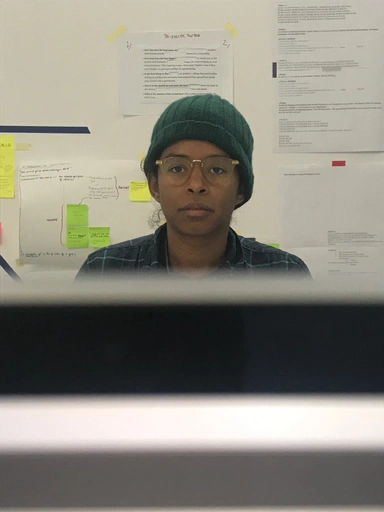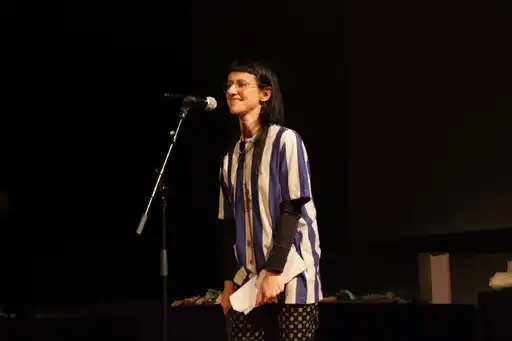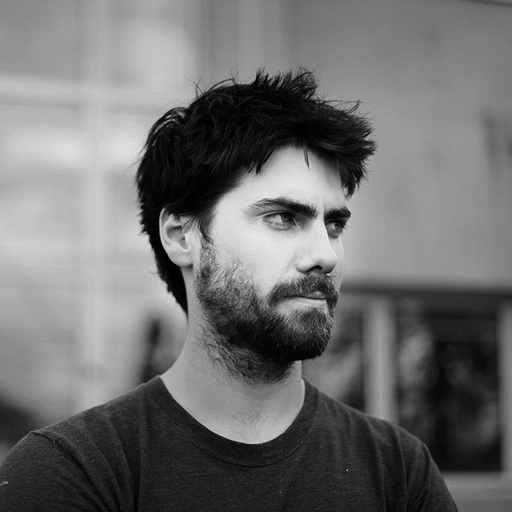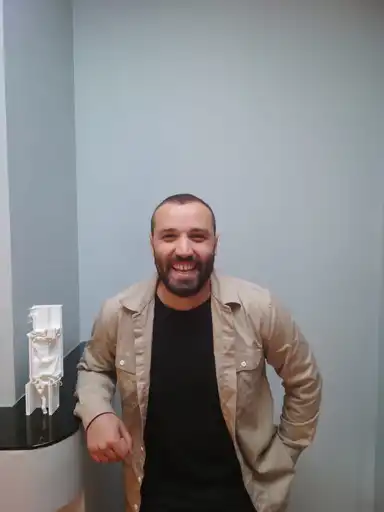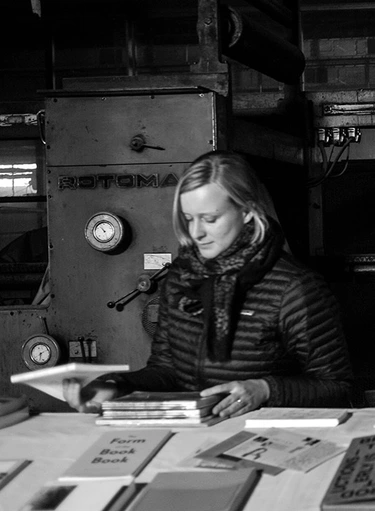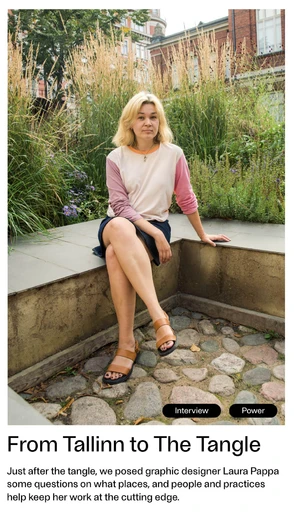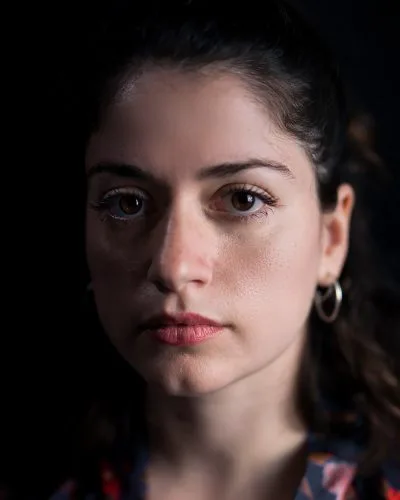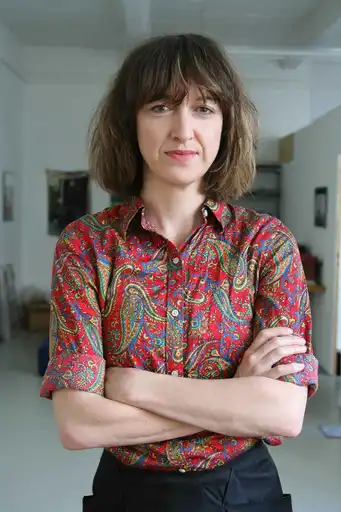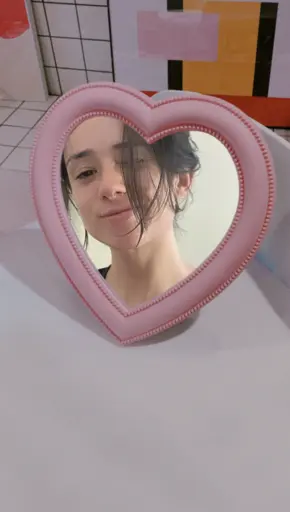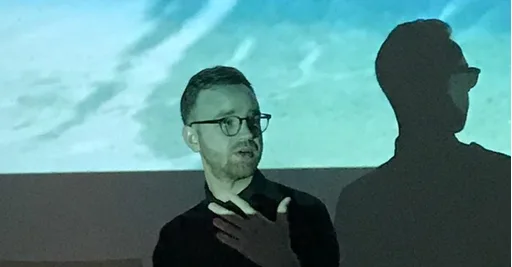event
30
Mar '22
until May 10
Lecture & workshop series by the 2021/2022 Research Fellows
Lecture & workshop series by the 2021/2022 Research Fellows
The research fellowship project is an initiative for artists, designers, theorists and other makers. It aims to facilitate and support short term artistic research projects, in collaboration with one of the departments of the schools. During the fellowship, the invited researchers share their process and findings with students and the Gerrit Rietveld community at large. The Fellows in Process series in particular aims to aid this interaction, while engendering meaningful conversations between the fellows, students and teachers of both institutes.
Events are open to Rietveld and Sandberg students and teachers.
For more information and signing up please check the schedule via:
tinyurl.com/fellowsinprocess
rethinking data
For more information and signing up please check the schedule via:
tinyurl.com/fellowsinprocess
rethinking data
April 13, 12-17 - workshop by Wael el Allouche
April 20, time TBA - workshop by Martino Morandi & Anita Burato
March 20, 16-18 - workshop by Taylor Le Melle
April 7, 15:30-16:30 - lecture performance by Clementine Edwards
April 14, 10-12 - online lecture by Rachel O’Reilly
April 28, time TBA - lecture by Jason Handrik Hansma
April 12, 19-21 - lecture performance by Octave Rimbert-Riviere
April 13 & 14, 10-16 - presentation & outdoor workshop by Elisabeth Klement & Laura Pappa
April 14, 13-14 - lecture by Elia Kalogianni
May 10, 16-17 - lecture performance by Maria Mazzanti
Taylor Le Melle: DuizendBlad
30-03-2022
16.00-18.00
IJsbaanpad 9 (Pand Zuid)
The workshop 'DuizenBlad' will be both a tasting and a writing exercise. Together we will taste the various methods of extracting essential properties of the Yarrow plant and do our best to identify the sensations created by the different extractions. No prior experience with plants, tasting or writing is required.
16.00-18.00
IJsbaanpad 9 (Pand Zuid)
The workshop 'DuizenBlad' will be both a tasting and a writing exercise. Together we will taste the various methods of extracting essential properties of the Yarrow plant and do our best to identify the sensations created by the different extractions. No prior experience with plants, tasting or writing is required.
Taylor Le Melle has grown to find biography less cringe through building a practice of describing their activities with present participle phrases (“Taylor is writing”) and shedding the practice of categorising states of being (“Taylor is a writer”). Taylor has trained in art history, architectural theory and developmental psychology. From 2017 to 2022 they ran a publishing collective, PSS, through which they have edited and produced several collections of science fantasy, theory and one poetry chapbook with contemporary artists. This year, they are working their own book-length project for which they are making a series of 'draft objects' which both facilitate and result from the production of text.
Clementine Edwards: Minor Reveries
07-04-2022
15.30-16.30
Auditorium 3rd floor BC Building
Finding its form in the dolls’ house, this lecture-performance animates Clementine Edwards’ exploration of miniatures. The bourgeois 17th century Dutch poppenhuis renders, at very small scale, some of the material details of European colonialism and its universe of values and beliefs. Moving through the dolls’ house rooms, Clementine will gesture towards certain structures of power and, through magnification, colour in otherwise.
15.30-16.30
Auditorium 3rd floor BC Building
Finding its form in the dolls’ house, this lecture-performance animates Clementine Edwards’ exploration of miniatures. The bourgeois 17th century Dutch poppenhuis renders, at very small scale, some of the material details of European colonialism and its universe of values and beliefs. Moving through the dolls’ house rooms, Clementine will gesture towards certain structures of power and, through magnification, colour in otherwise.
Clementine Edwards is a Rotterdam-based artist working between sculpture and writing. They're the artist and editor of The Material Kinship Reader, co-edited with Kris Dittel, which thinks material beyond extraction and kinship beyond the nuclear family. Clementine’s practice engages with craft, climate crisis, gender and how lived experience, including trauma, narrates meaning-making. It asks, How to honour and remember the worlds that we are immersed in, and the contexts that shape us, nourish us and resist us?
Octave Rimbert-Rivière: Leak, Creak, Break
12-04-2022
19.00-21.00
K18+ K29 basement BC building
Leaks, Creaks, Breaks is an immersive tutorial where analog processes involved in the making of an object are translated into sounds, colors and virtual materials using dynamic simulation tools.
This audio-visual performance is made in collaboration with Jonathan Castro, Guillaume Roux and Javier Rodriguez."
19.00-21.00
K18+ K29 basement BC building
Leaks, Creaks, Breaks is an immersive tutorial where analog processes involved in the making of an object are translated into sounds, colors and virtual materials using dynamic simulation tools.
This audio-visual performance is made in collaboration with Jonathan Castro, Guillaume Roux and Javier Rodriguez."
Octave Rimbert-Rivière cherishes matter. He worships it and coaxes it, flattering it as one caresses the flank of an animal that is gradually domesticated. Tenderly, he cultivates a fleshly relationship with it. And his growing interest in digital potential does not in any way virtualize his practice, which remains fiercely anchored in the tangible. It remains touching. It marries pottery and new technologies. For him, any creation is the product of collages. His clay is drawn from the depths of the dark web, and is smeared with fun, by hand. If the sculptor regularly visits the digital world — and we cannot insist enough on the tactile dimension of the term ‘digital’ — it is to experiment with the modelling that such a tool allows, as would a potter’s rib. The computer is a vector of distortion, a machine to hack an archetypal form. The artist transforms the glitch into porcelain, pouring electronic flux and liquid clay into molds. In turn, his mugs and teapots both contain and spill. The glazes ooze, crackle, split. They bubble too. There is no limit to the amount of crust they can produce, because in ceramics, it’s always firing. From this angry magma, it is a question of creating functional objects, which are truly useful. This unblocks them from the exhibition space, and after having exported them a first time from the screen, frees them even more to simply irrigate life, in a race towards the concrete. To escape plinths, to crack the codes, to break the boxes. The function liberates the work.
Wael el Allouche: Ways of Knowing: Digitizing Gestures
13-04-2022
11.00-16.00
GYM
Knowledge is a space, an abstract space where data points are collected, they form clusters of possible relations. AI, ML or NN have a way of finding connections within a dataset. It finds a solution or answers from a dataset, it even can find multiple solutions, either it finds it or it doesn't. Data is an abstract term, but it can be as tangible as we like it to be. In this workshop we are going to demystify data technology and see how we can use it ourselves. The smartphone will be our tool which we are going to use to document our movements, our gestures or how we sense space. "
11.00-16.00
GYM
Knowledge is a space, an abstract space where data points are collected, they form clusters of possible relations. AI, ML or NN have a way of finding connections within a dataset. It finds a solution or answers from a dataset, it even can find multiple solutions, either it finds it or it doesn't. Data is an abstract term, but it can be as tangible as we like it to be. In this workshop we are going to demystify data technology and see how we can use it ourselves. The smartphone will be our tool which we are going to use to document our movements, our gestures or how we sense space. "
Artist and Designer Wael el Allouche (TN/NL) graduated from the design department of the Gerrit Rietveld Academy. He is interested in the way abstractions, such as Data and Algorithms, shape reality and vice versa. By digitizing phenomena and objects from the world around him he tries to understand them, before returning them to reality as reconstructions.
Elisabeth Klement & Laura Pappa
13-04-2022 and 14-04-2022
10.00-16.00 , 10.00-10.30
Auditorium 3rd floor BC Building
This one day workshop imagines ways in which we can display work in the public space using Fred. Roeskestraat and its immediate surroundings as a playground to experiment and develop ideas.
10.00-16.00 , 10.00-10.30
Auditorium 3rd floor BC Building
This one day workshop imagines ways in which we can display work in the public space using Fred. Roeskestraat and its immediate surroundings as a playground to experiment and develop ideas.
Elisabeth Klement is a graphic designer who lives and works in Amsterdam, The Netherlands. She has graduated from the Gerrit Rietveld Academie graphic design department and Critical Studies department at Sandberg Instituut. Together with Laura Pappa she runs Asterisk Summer School, an annual summer program based in Tallinn that deals with exploring the boarders of graphic design practices. Elisabeth has also run the art bookshop San Serriffe in Amsterdam with Pieter Verbeke since 2011. In 2015 she launched the publication series Apparition of the Ampersand, which aims to define the extended field of the practice of graphic design through interviews and writings by practitioners working in the fringes of the discipline.
Elia Kalogianni: Prickly Pears: Filming Behind The Fence
14-04-2022
13.00-14.00
Auditorium 3rd floor BC Building
In this talk, Elia will explore the connections between abandoned buildings, prickly pears, local rumors and certain choices made in filmmaking with no script.Diving in some examples of her main inspirations and looking at similar projects through the lens of Yorgos Kyvernitis, the cinematographer of her film in progress 'Prickly Pears', she will describe how nature took over junta's plans in Nafplio city (Greece) back in the 70s and how all this research process can be translated in the formation of a film. After the lecture, an open discussion will follow.
13.00-14.00
Auditorium 3rd floor BC Building
In this talk, Elia will explore the connections between abandoned buildings, prickly pears, local rumors and certain choices made in filmmaking with no script.Diving in some examples of her main inspirations and looking at similar projects through the lens of Yorgos Kyvernitis, the cinematographer of her film in progress 'Prickly Pears', she will describe how nature took over junta's plans in Nafplio city (Greece) back in the 70s and how all this research process can be translated in the formation of a film. After the lecture, an open discussion will follow.
Elia Kalogianni (1995) works as a filmmaker and visual artist. Her work combines films, video installations and video essays. In her practice, she gives value to what usually remains invisible and, adopting a female gaze approach, she aims to raise questions about loneliness, memories, contact, identity, surveillance and the distinction between reality and fantasy.
Rachel O Reilly: The Protection-Abandonment Fix of late liberal ecological imagination
14-04-2022
10.00-12.00
Online via Zoom
Within the ‘race for what’s left’ in extractive zones, the queer critique of contract is useful for radical media practice as a way to think and ‘screen’ justice coalitions infrastructurally, beyond intimate self-management, ideal object and policy identifications. This talk based on a case study will consider the role of different ontologies of images within a specific power/knowledge formation of ‘remote research’ in North Australia. Remote to what/who? Here, attending to groundwater is attending to struggles for narrative supremacy that play out in scenes of ‘Culture’ as (re)production and (as) ‘environmental regulation’ -ideas which have been spatially and racially abstracted since C19th and which are regionally paramount. How can engaged film antagonise value and be concerned with ‘how worlds are made, how forms of life are sustained and made viable’ (Mitropoulos) without assuming the colonial ‘transparency thesis’ (da Silva) of modern scientific representation?
10.00-12.00
Online via Zoom
Within the ‘race for what’s left’ in extractive zones, the queer critique of contract is useful for radical media practice as a way to think and ‘screen’ justice coalitions infrastructurally, beyond intimate self-management, ideal object and policy identifications. This talk based on a case study will consider the role of different ontologies of images within a specific power/knowledge formation of ‘remote research’ in North Australia. Remote to what/who? Here, attending to groundwater is attending to struggles for narrative supremacy that play out in scenes of ‘Culture’ as (re)production and (as) ‘environmental regulation’ -ideas which have been spatially and racially abstracted since C19th and which are regionally paramount. How can engaged film antagonise value and be concerned with ‘how worlds are made, how forms of life are sustained and made viable’ (Mitropoulos) without assuming the colonial ‘transparency thesis’ (da Silva) of modern scientific representation?
Rachel O'Reilly is an artist, poet, critic, independent curator and researcher whose work explores relationships between art and situated cultural practice, media and psychoanalysis, aesthetic philosophy and political economy. She was formerly a curator of film, video and new media at the Gallery of Modern Art, Brisbane, including the Fifth Asia Pacific Triennial of Contemporary Art and a researcher in residence at the Jan van Eyck Academie.
María Mazzanti: In-betweenness
10-05-2022
16.00-17.00
Theory Stairs
Storms are habitually mapped, named, and personified to configure a system to read them. This literacy implies that we can make projections and forecast what will happen by using a series of infrastructures and anticipatory measures to cohabit with meteorological events in the built environment. The departure of such languages and frameworks of predictability is transcribed into failed responses to withstand changes and disruptions, creating the conditions for a state of crisis¹. In-betweenness is a lecture-performance that examines floodings as fluctuating spatial conditions, situating them somewhere in the middle of weather predictability and climate catastrophe while opening questions about the dynamics of continuity, separation, transition, mobility and liminality in urban landscapes.
1. Alice Rougeaux. Soapbox Journal.
16.00-17.00
Theory Stairs
Storms are habitually mapped, named, and personified to configure a system to read them. This literacy implies that we can make projections and forecast what will happen by using a series of infrastructures and anticipatory measures to cohabit with meteorological events in the built environment. The departure of such languages and frameworks of predictability is transcribed into failed responses to withstand changes and disruptions, creating the conditions for a state of crisis¹. In-betweenness is a lecture-performance that examines floodings as fluctuating spatial conditions, situating them somewhere in the middle of weather predictability and climate catastrophe while opening questions about the dynamics of continuity, separation, transition, mobility and liminality in urban landscapes.
1. Alice Rougeaux. Soapbox Journal.
María Mazzanti is an architect, editor and educator focused on critical spatial practices, experimental publishing and the environmental crisis. She is an editor in Failed Architecture and the managing editor of VOLUME magazine. She teaches at the interior architecture departments in the Bachelor program of the Gerrit Rietveld Academy and the Master’s program at the Sandberg Instituut. She was a research fellow in the same institutions between 2021-2022.
Jason Hansma: Slur
28-04-2022
16.30-18.00
Theory Stairs
Working with the idea of the 'Slur' Jason's work unpacks the inarticulate slurry of language around us. Based on the artist's personal experience with aphasic language, and desires to 'decategorise' in his practice. The lecture touches on a range of topics, from his collection of waves smashing into architecture, the 'hyperliquidity' of financial markets, chopped and screwed music, the artistic and curatorial methods of slurring that underly the exhibition formats at Shimmer, to the projects in the hallways of UNESCO. The slur, our thick tongue, that undefined slippery mess is proposed as the wet-media of the studio. Artistic practice that slips past attempts of containments so often the driver in cultural, academic and social standardisation are rethought as a liquid coming together.
16.30-18.00
Theory Stairs
Working with the idea of the 'Slur' Jason's work unpacks the inarticulate slurry of language around us. Based on the artist's personal experience with aphasic language, and desires to 'decategorise' in his practice. The lecture touches on a range of topics, from his collection of waves smashing into architecture, the 'hyperliquidity' of financial markets, chopped and screwed music, the artistic and curatorial methods of slurring that underly the exhibition formats at Shimmer, to the projects in the hallways of UNESCO. The slur, our thick tongue, that undefined slippery mess is proposed as the wet-media of the studio. Artistic practice that slips past attempts of containments so often the driver in cultural, academic and social standardisation are rethought as a liquid coming together.
Jason Hendrik Hansma’s (b.1988) work explores the in-between, the liminal, and the nearly articulate. Drawing from a wide range of references and materials, Hansma’s work deals with standards, architectural, cultural, and physical, along with how works are made outside of standardized norms. For Hansma, a photograph might be created over months, an entire exhibition might happen in ‘transitional spaces’ such as hallways, doorways, or window sills. A hand-stitched curtain slows down an exhibition’s motion, providing a soft cut moved by a slight breeze from outside air or a film focuses on the moment a wave crashes into architecture. Amateur videos of embers recorded from bushfires are cut to chopped and screwed, and textiles from the artist’s ancestors are refolded and formed into new painterly landscapes. In the work, language (and the loss of language) plays a key role in moving through the politics of aesthetics to reconsider the means we use to locate ourselves through and with each other.
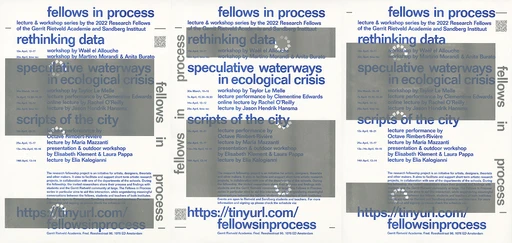
event
30
Mar '22
part of:
event
07
Apr '22
event
12
Apr '22
event
13
Apr '22
event
13
Apr '22
until Apr 14
part of:
event
14
Apr '22
event
event
28
Apr '22
part of:
event
10
May '22
part of:
